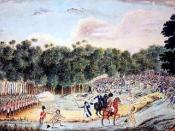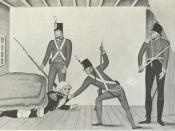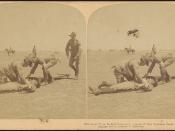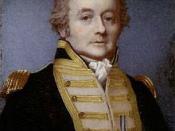There are many reasons as to how the Rum Corps (formally known as the New South Wales Corps) came to have so much power over the first settlement of Australia. The NSW Corps were sent to Australia to be the enforcers of law, after the Marines departed Australia. Because of this, they had a major influence over the survival and growth of the colony. They all had comparative wealth, and a considerable amount of control over convict labour. They also came to have so much power as it was easy for them to overthrow those who challenged them and their rules/punishments; due to their high status within the colony.
For many, serving in New South Wales was not a good thought, as it was a struggling colony in a strange, recently discovered land far from their homes and loved ones; however some were interested. Those who joined believed it to be an easy way to a quick promotion and money through the trade of rum.
For those who joined, it did seem to be what they thought it would be, considering their reputation nowadays.
During the first 25 years of settlement, money was insufficient and hard to come by. Most of the coins were pennies made from copper, but they were large and heavy. This made the transaction of goods and the paying of wages difficult as they did not have enough money to pay workers. Because of the lack of the amounts of money required, bartering became a quick and regular way of purchasing goods.
Trade was important for the growth of the colony, as it made them more self-reliant. Merchant ships from South America and Asia began to regularly stop off at Sydney offering cargoes of food, clothing and other supplies such as rum and other liquors. When merchant ships arrived at Sydney, governors would buy only part of the cargo for government stores and allowed the military officers (NSW Corps) and government officials to purchase the rest. Large profits were made from the sales of rum. In 1800, the merchant ship, ÃÂThe Bengal,ÃÂ passed through Sydney with rum and other goods. The ships captain sold rum to the traders for eight shillings per gallon (roughly five litres) and the traders would then sell it to colonists for between twenty and thirty shillings per gallon. In one six month period, 36000 gallons of rum and 22000 gallons of wine was bought and sold for a population of approximately 5000 people. However, an endless alcohol supply like this did have its effect; convicts and officers were always either drunk or hung-over. Some only did their jobs for rum; others were lazy and got it off other people. Alcohol became AustraliaÃÂs social and economic ÃÂfabric.ÃÂDuring the 1790ÃÂs, the officers of the NSW corps did so much rum trading that they became more commonly known as the ÃÂNew South Wales Rum CorpsÃÂ. The officers knew that if they had rum, they had money and thus the power to pressure the governor.
On the 26th of January 1808, the New South Wales Corps rebelled at Captain William Bligh. Their reason for this was that Bligh had tried everything in his power to put a stop to the reign of the NSW Corps and make it illegal to trade rum. They, along with members of the colony, marched to his house and found Bligh supposedly hiding under his bed, apparently after trying to destroy as many official government documents as possible. They placed Bligh under house arrest and later allowed him to return to England. For two years after this, the colony was governed by officers of the Rum Corps.
In conclusion, the New South Wales Corps gained their power through the selling and paying of services through rum, as well as their position as the enforcers of law. The colony became so dependant on rum that when someone came and tried to put a stop to it, they were furious and did everything in their power to ruin their reputable name. The NSW Corps dominated the early governors with their seemingly endless supplies of liquor, and it seemed that the rum trade would never end; until Captain Lachlan Macquarie was sent to govern Australia.
BibliographyButler, R. (1979). A Tide of Rum. CCH Australia Limited.
(1982). The Making of Australia: Prisoners and Gaolers. Bay Books.
Sheppard, B. (2003). The Rum Rebellion. Binarq Publishing, Carlton.
Trends: drink [Internet]. Available from: http://www.signsofthetimes.org.au/archives/2008/july/trends.shtm [Accessed 28 August, 2009][Internet]. Available from: http://www.grandpaperpencil.net/austral/ashorth.htm [Accessed 1 September][Internet]. Available from: http://www.solarnavigator.net/solar_cola/rum.htm [Accessed 1 September, 2009]New South Wales Corps [Internet]. Available from: http://www.eurekacouncil.com.au/Australia-History/History-Pages/1789-Rum_Corps.htm [Accessed 1 September, 2009].
The Rum Rebellion [Internet]. Available from: http://www.dailytelegraph.com.au/news/the-rum-rebellion/story-e6frewu9-1111115396064 [Accessed 1 September, 2009].






I agree
I agree with the A-, well written and great detail is given. But, there is a few grammatical errors probably why it was given a lower score. Also, the writer has his sources listed which is really good.
0 out of 0 people found this comment useful.